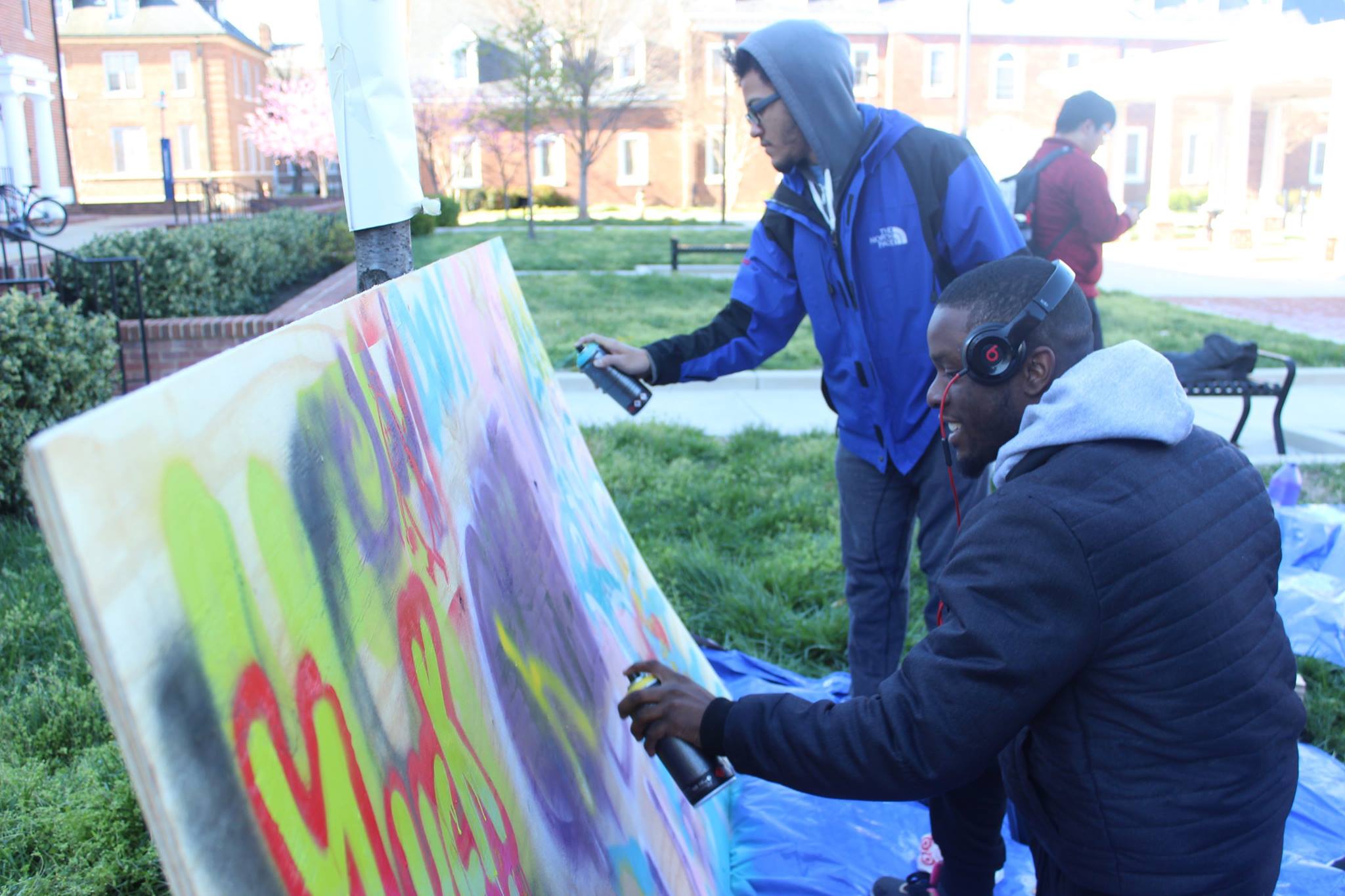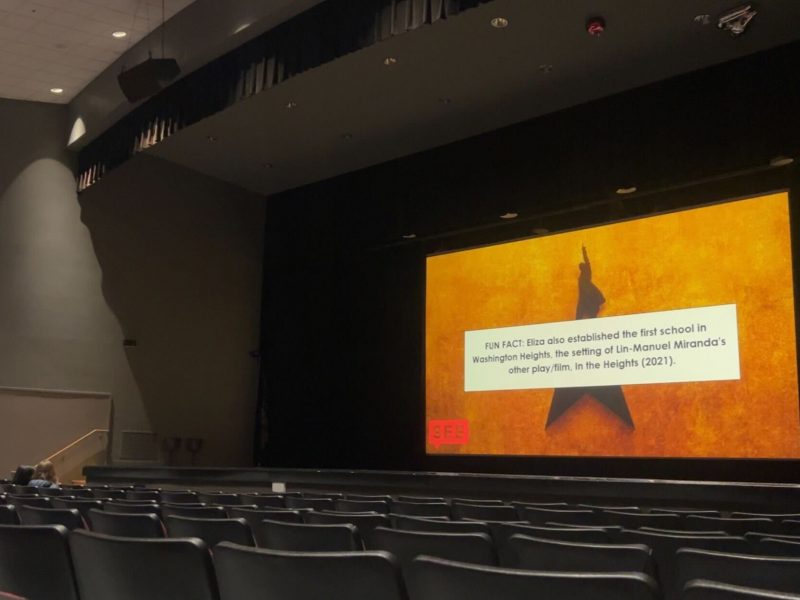By Miranda Jackson and Josh Magness
Those passing by the Nyumburu Cultural Center on Thursday night might have heard the roar of nearly 200 people as Keph Swag, a 16-year-old rapper from the Washington area, stepped onto the stage inside. With Rae Sremmurd vibes and ski goggles strapped to the side of his head, Swag jumped around (and off) the stage during the performance of his song “Too Strong.”
Channeling his energy, the growing number of attendees inched closer to the stage, forcing some to stand on tables to get a good view. But no one seemed to care — in fact, the fourth night of this university’s Hip-Hop Festival, put on by the Black Student Union, felt like a giant family reunion.
There was one rule of the evening: No swearing on stage, or your mic will be snatched. Opening the slate of performances, the Hip-Hop Orchestra (yes, it’s a thing) broke that rule seconds after it was announced, performing their original songs that blend classical instrumentals with rap lyricism. Later, a charismatic performer named Curtis covered “Electric Feel” by MGMT in homage to what he said was the African-American influence on rock-‘n’-roll.
Poetry and spoken-word performances, imbued with passion and stimulating imagery, were also sprinkled throughout the night. One crowd favorite ended in a litany of vivid statements about black empowerment that elicited louder and louder cheers.
“Need I continue?” asked the student performer.
“Yes, baby!” an audience member shouted back.
The performances wrapped up with Thraxxx, a popular recording artist who ended the night with an explosion of energy aided by his trap-influenced music.
Of course, no family reunion is complete without a little tension. Some members of on-campus multicultural fraternities nearly sparred during the fraternity roll call. Participants from each organization came forward as a group with their “stroll” — when members line up to step, chant and dance — sparking tension until attendees split them up.
But the first three events of the festival came with less fanfare.
Foreshadowing a trend throughout the week, Monday night’s general body meeting began late. African-American studies lecturer Jason Nichols gave an interactive speech to an intimate crowd on the four pillars of hip-hop: emceeing, DJing, B-boying and graffiti.
“Hip-hop is life,” said Nichols, setting the tone for the week. “Hip-Hop is everything.”
A table full of Jimmy John’s subs and a lawn covered in graffiti materials proved to be beacons for the 50-plus students who came and went through the Washington Quad for Tuesday’s Art Beat. The pungent spray paint filled the air as friends gathered to reminisce over their weekends and new music. It was reminiscent of a family cookout, complete with an aux cord for DJing and plenty of time for humorous stories about one another.
On Wednesday night, a panel discussion with music industry officials rounded out the opening trio of events. Assembled in Knight Hall, students listened to music journalists, PR representatives and “record breakers” — those who help artists drop new tracks — detail the biggest challenges of working in the industry and their predictions for the next trends in music.
Sabrina Figueiredo-Vaz Holder, who works at SiriusXM Radio, was among those speakers. As the sole woman on the panel, Figueiredo-Vaz Holder emphasized the uphill battle females face in the male-dominated music industry.
“Don’t give up; just know it’s going to be rough,” she said. “It’s not going to be easy, especially for women. But if you stay focused, you’ll get through it.”
Freshman journalism major Alexander Asifo, a budding rapper who “eats, sleeps and breathes music,” made sure not to miss Wednesday’s panel. Asifo said two pieces of advice were extremely impactful: that artists, no matter how talented, need to understand the business side of the industry and that sacrifices are necessary to advance in the profession.
That second piece of advice, Asifo said, is relevant as he juggles schoolwork and his craft.
The hardest part is “having a hunger for music, but at the same time having to devote your life to school and all that,” Asifo said. “You want to work on music, but you might have a project coming up.”
For the week’s final event, condoms flew, dancers dabbed and hip-hop music reverberated throughout Stamp Student Union’s Baltimore Room.
It was all a part of the “TrapSync battle,” a hip-hop lip syncing competition inspired by the popular TV show “Lip Sync Battle.” Students at the event could also donate cases of water to aid the city of Flint, Michigan.
“Team Water” and “Team Finiessiery,” two teams of student performers, were ready to duel it out over popular hip-hop songs in three rounds: the 1990s, the 2000s, and the 2010s. The spoils of victory were merely bragging rights, but the rival groups were laser-focused on triumph.
First up was “Team Water.” An animated performance of “Fresh Prince of Bel Air (Theme Song),” replete with an impromptu backflip and sultry body shakes, breathed life into the already energized crowd.
Not to be outdone, “Team Finiessiery” responded with a few golden moments, dropping low to the beats of “Int’l Player’s Anthem” and, to the crowd’s delight, flinging a handful of condoms to the back of the room.
“Ay! Ay! Ay!” the crowd, now ballooning to about 100 people, began chanting.
Other performances, which included hits from artists like TLC, Nicki Minaj, 50 Cent and Bell Biv Devoe, maintained that high level of enthusiasm. Huddling closer to the stage, the attendees boisterously sang and rapped along.
Just as with Thursday night, the mass of people felt like a gaggle of friends and family. Performers traded wardrobes like siblings, attendees teased their cohorts onstage, and no one was willing to shy away from a friendly rivalry. Everyone, it seemed, knew everyone else. If they didn’t, it was impossible to tell.
As the event concluded at about 11 p.m. and the incessant pounding of hip-hop tracks dissipated, students left in huge clumps, piling onto shuttle buses outside of Stamp to likely continue the nightlong celebration somewhere else. The week’s festivities had come and gone, but the bond between students and their fervent passion for hip-hop, however, appeared far from over.



